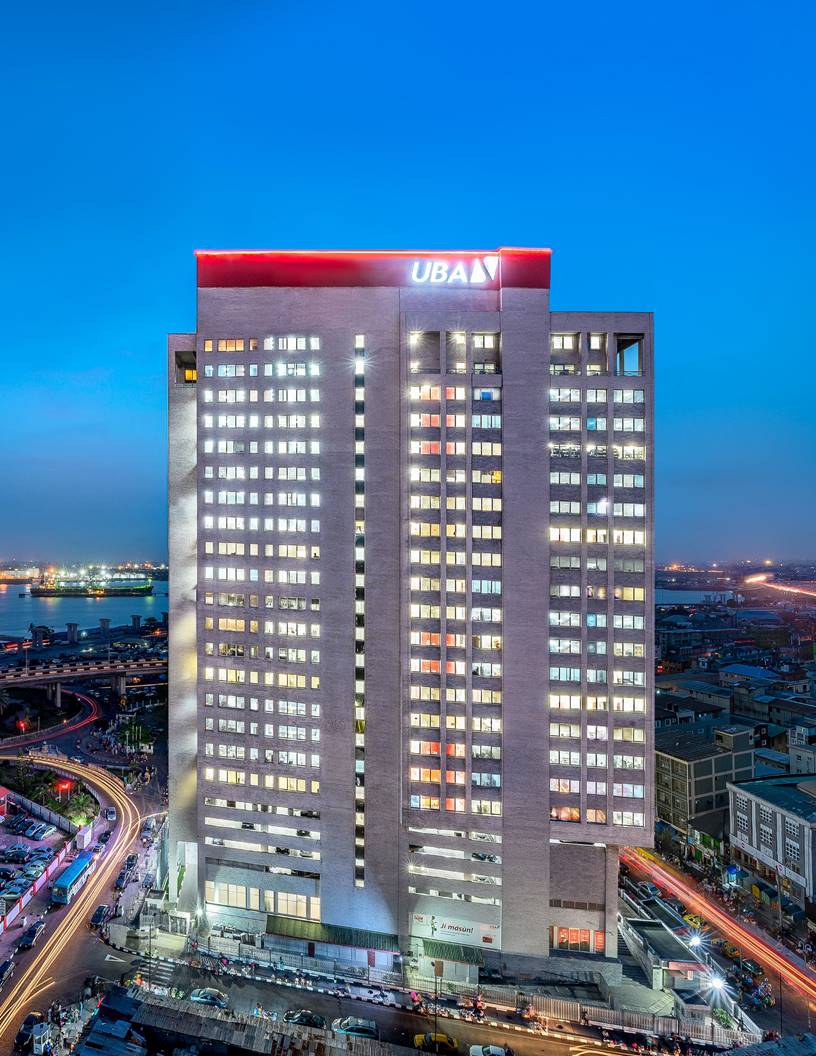E-Financial
Steve Babaeko, Nnadi Owanbugbe to Speak @ FCMB Flexx & Smartpreneur’s Online Business Masterclass

Leading financial services provider, First City Monument Bank (FCMB) through its Flexx Online Masterclass, will be propagating best practice systems for business planning and growth in an upcoming session themed Building A Profitable Online Business.

This special edition of the Flexx Online Masterclass is set to hold on Thursday, June 3, 2021, at 1 pm. The masterclass will help business owners to create a strong environment for sustained success, and also highlight why a strong digital presence is important in effectively building a brand image.
FCMB Flexx, an account created to empower young Nigerian entrepreneurs, continues to equip SMEs and Startups with the required tools to scale and Smartpreneur, as an entrepreneurship platform, is excited to partner with FCMB Flexx to facilitate conversations around business growth and the core focus areas that will be discussed in this masterclass which includes business planning, basic elements of marketing and advertising, sales drive, and general online visibility tactics.
Guest speakers, Steve Babaeko and Nancy Nnadi will be discussing topics drawn from the focus areas of the masterclass.
Nnadi Nancy is the Founder of Agunancy Nigeria Ltd, a telecom distribution company founded 14 years ago and a leading dealer with the top 3 telecommunications companies in Nigeria.
Today, Nancy is on a mission to increase the number of successful and healthy businesses in Africa, one entrepreneur at a time, hence the birth of The Nancy Nnadi Company. Her mission is simple, to raise wealthy entrepreneurs, which will, in turn, lead to the creation of more businesses, invariably, jobs for people. Through her business structure and finance coaching, she helps entrepreneurs go from scarcity to abundance using her signature courses.
Nancy continues to spread this message of inspiration and intentional action through various platforms, and inspiring entrepreneurs to do business diligently, intelligently, and ethically.
She has received several awards and recognition, most recently is the business coach of the year award 2020 by The Entrepreneur Award (TEA).
She was also featured as one of the 10 Wealth & Finance experts to watch out for in 2021 by Yahoo Finance. She is the chairperson of the Enterprise Risk and Management Committee, a member of the board of directors of Cititrust Financial Services Group PLC, and also a member of First Guarantee Healthcare Limited.
Steve Babaeko is an unusual type of businessman. In an industry that seemed to have run out of inspirational stories, he stepped in and wrote a new chapter. Now, his X3M Ideas Group, which he founded in 2012, has become the yardstick for a new generation of Nigerian creative entrepreneurs.
Steve’s unyielding belief in looking challenges in the eye and staring them down has attracted the best talents to his firm and pulled in clients from around the world.
For more than 23 years, he has been helping to create some of the most iconic marketing works on the continent. He continues to represent Africa on the global stage, having been a member of the jury at the New York Advertising Festival, the Loeries, and the African Cristal Awards.
He has also been a speaker at the Cannes Lions Festival and also one of Adweek’s Top 100 Creatives in the world in 2019. Steve holds a bachelor’s degree in Theatre Arts from the esteemed Ahmadu Bello University, Zaria, Nigeria.
He is currently the President of the Association of Advertising Agencies of Nigeria (AAAN) and a member of the board of the International Advertising Association (I.A.A), Nigeria. Outside advertising, he was the former Chairman, Public Relations Committee of the Nigerian-American Chamber of Commerce.
The masterclass will be moderated by media personality and businesswoman, Tallulah Doherty-Adetona, who is passionate about entrepreneurship and African business success stories.
At the end of this event, participants should understand the different types of business growth strategies, the basics of marketing and advertising, and the benefits of an online presence. Participants should be able to develop their own overall business strategy with goals, tactics, timelines, and costs for the future success of their businesses.
E-Financial
UBA Announces Successful Completion of System Upgrade

United Bank for Africa (UBA) has successfully completed its much-anticipated system upgrade, restoring all banking services to normalcy.

In a message to customers, UBA reassured customers that they could now log in to the mobile app and enjoy a smoother, more efficient banking experience.
The bank acknowledged any inconvenience caused by the process and reaffirmed its commitment to providing top-tier financial services.
“We are pleased to inform you that our mobile app upgrade has been completed, and all services have been fully restored. You can now log in and enjoy a smoother banking experience and improved services,” UBA announced.
While the upgrade promises enhanced functionality and reliability, UBA urged customers experiencing any lingering issues to reach out to its 24-hour Customer Fulfilment Centre via 02012808822 or email [email protected] for prompt assistance.
With the completion of the process, UBA reassured its customers of its dedication to innovation and excellence in banking.
E-Financial
SERAP Gives CBN 48-Hour Ultimatum to Withdraw ATM Fee Hike

Socio-Economic Rights and Accountability Project (SERAP) has called on the Central Bank of Nigeria (CBN) to immediately revoke its recent increase in Automated Teller Machine (ATM) transaction fees, describing the move as “Patently unlawful, unfair, unreasonable, and unjust.”

In an open letter addressed to Olayemi Cardoso, governor, CBN, and dated February 15, 2025, SERAP warned that the fee hike would worsen economic hardship for millions of Nigerians, particularly those at the lower end of the financial spectrum.
The rights group gave the apex bank a 48-hour deadline to reverse the policy or face legal action.
The CBN’s new directive mandated that ATM withdrawals at off-site locations, such as shopping malls, airports, and standalone cash points, will attract an N100 charge per N20,000 withdrawal.
Additionally, a surcharge of up to N500 may apply for transactions conducted at certain locations. The new fees are set to take effect from March 1, 2025.
In its letter, signed by Kolawole Oluwadare, deputy director, SRERAP criticized the policy, arguing that it would disproportionately affect struggling Nigerians while benefiting commercial banks.
“The manifestly unfair increase in ATM transaction fees will hit hardest those at the bottom of the economy and exacerbate the growing poverty in the country,” SERAP stated.
The organization further argued that financial institutions should bear the cost of banking operations, rather than shifting the burden onto customers, particularly those with limited financial means.
SERAP accused the CBN of prioritizing the interests of banks over the welfare of ordinary Nigerians, many of whom already struggle with the high cost of living.
The group pointed out that banks continue to report record-breaking profits while imposing excessive charges on customers.
“CBN policies should not be skewed against poor Nigerians and heavily in favour of banks that continue to declare trillions of naira in profits, mostly at the expense of their customers.
“The increase in ATM transaction fees will inflict misery on Nigerians and contribute to human rights abuses,” the letter read.
SERAP also noted that the policy contradicts President Bola Tinubu’s commitment to tackling poverty in Nigeria.
The rights group argued that the CBN’s action violates multiple legal provisions, including the Nigerian Constitution, the CBN Act, and the Federal Competition and Consumer Protection Act.
SERAP highlighted specific sections of these laws that prohibit unfair business practices and protect consumers from exploitative charges.
According to SERAP, the increase in ATM fees discriminates against low-income Nigerians who may struggle to afford the higher fees, creates a two-tiered financial system that favours the wealthy, contradicts the CBN’s stated mission to promote national economic well-being, and violates international human rights obligations under the United Nations Guiding Principles on Business and Human Rights,
“The CBN has responsibilities under the UNGPs to take effective steps to avoid or mitigate potential human rights harm and to consider ending any charges or transaction fees where severe negative human rights consequences cannot be avoided or mitigated,” SERAP asserted.
“We would be grateful if the recommended measures are taken within 48 hours of the receipt and/or publication of this letter.
“If we have not heard from you by then, SERAP shall take all appropriate legal actions to compel you and the CBN to comply with our request in the public interest,” the letter warned.
E-Financial
FG Seeks Fresh $300m Loan from World Bank for Health Security

Federal government has engaged the World Bank for a fresh $300m loan to strengthen Nigeria’s health security infrastructure.

Information obtained from the World Bank showed that the loan, which is under consideration, will be implemented by the Nigeria Centre for Disease Control (NCDC) with the Federal Ministry of Finance acting as borrower on behalf of the Federal Government.
According to information on the World Bank website, the loan project is expected to “increase regional collaboration and health system capacities to prevent, detect, and respond to health emergencies in the Federal Republic of Nigeria.”
The project is currently in the pipeline stage, with the disclosure date scheduled for February 6, 2025.
The World Bank board is expected to give its approval on July 30, 2025, following necessary assessments. The appraisal is set for April 14, 2025, and implementation will commence in the 2026 fiscal year.
According to a document on the concept of environmental and social review, the Nigeria Health Security Programme aligns with broader government efforts to enhance disease surveillance, diagnostic capabilities, emergency response, and laboratory networks across the 36 states and the Federal Capital Territory.
The programme’s primary objective is to enhance regional collaboration and strengthen Nigeria’s health systems to deal with emergencies. It falls within the World Bank’s investment in health, nutrition, and population sectors across Western and Central Africa.
According to the Environmental and Social Review Summary of the project, HeSP will expand molecular laboratory capacity, upgrade primary healthcare centres, establish emergency operation centres, and construct warehouses.
It will also deploy mobile laboratories and install water, sanitation, and hygiene facilities alongside solar energy systems to support health infrastructure improvements.
Although the total project cost is yet to be determined, the World Bank has committed $300m to the initiative. The funds aim to bolster Nigeria’s pandemic preparedness and improve response mechanisms for public health threats.
The initiative comes as Nigeria strengthens its public health infrastructure following lessons from previous outbreaks, including COVID-19.
If approved, the loan will support the NCDC in improving disease surveillance, diagnostics, emergency response, and laboratory services.
Nigeria has previously secured funding from international financial institutions to boost healthcare resilience, including financing for vaccine procurement, emergency medical services, and infrastructure development.
However, the project, categorised as a high-priority public health intervention, carries substantial environmental and social risks due to potential health, safety, and ecological concerns associated with infrastructure expansion.
Identified risks include increased medical waste, occupational hazards, and heightened energy and water demands.
Social risks range from potential grievances from stakeholders to concerns over land acquisition and implementing health interventions in conflict-prone areas.

 E-Financial1 day ago
E-Financial1 day agoSERAP Gives CBN 48-Hour Ultimatum to Withdraw ATM Fee Hike

 E-Financial1 day ago
E-Financial1 day agoFG Seeks Fresh $300m Loan from World Bank for Health Security

 General News1 day ago
General News1 day agoFG Drops Merger of NCAA, NAMA

 News1 day ago
News1 day agoBinance Chief Insists Some FG Officials, Reps Demand $150m Bribe

 News1 day ago
News1 day agoinDrive Unveils Cashless Bank Transfer Feature in Nigeria

 E-Financial1 day ago
E-Financial1 day agoCardinalStone Acquires Radix Pension Managers

 Telecom1 day ago
Telecom1 day agoNITDA Pledges to Foster Innovation with Cloud Infrastructure and AI Applications

 Telecom11 hours ago
Telecom11 hours agoToriola, MTN Nigeria CEO again Defends Tariff Hikes amidst Backlash


























